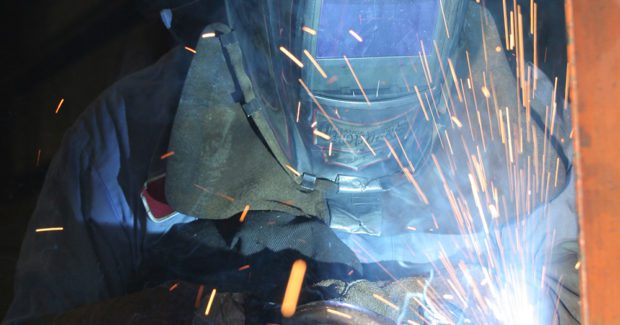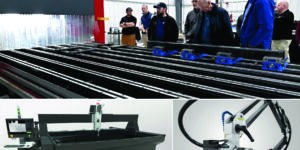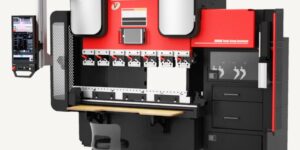Demand High for Certified Welding Inspectors
The uptick in industrial welding in the Southeast has created a ripple effect across the U.S. that is causing sheet metal fabrication shops nationwide to feel an increase in production.
Posted: October 21, 2016
The uptick in industrial welding in the nation’s Southeast corner has created a ripple effect across the country. While most of the action is taking place in Georgia and South Carolina, sheet metal fabrication shops nationwide that are stocking the projects are feeling the increase in production. While it’s a happy problem, these companies are experiencing a high demand for Certified Welding Inspectors (CWI) who ensure the quality and safety of the welds before they leave the shop, as well as test and certify welders on the local level.
The internationally and nationally recognized CWI is a highly sought-after distinction that is dwindling in members as sheet metal workers retire or take higher-level positions, minimizing the actual number of CWIs on job sites. “Inspections are critical and there are simply not enough CWIs to go around,” said Mike Harris, the program administrator and CWI for the International Training Institute (ITI; Fairfax, VA), the education side of the unionized sheet metal and welding industry.
“There’s no working fast on critical work. Each weld must be 100 percent, 100 percent of the time,” noted Greg Andrist, a business representative and training coordinator for Local No. 10 in Southern Minnesota. “Otherwise, the work goes in the garbage and the operator has to start over. They’ve got to do quality work or they’ll refuse the weld and send it back.”
To help steadily increase the numbers of certified inspectors on site, ITI is offering three classes this year to help potential CWIs prepare for the test. The 40-hour, one-week classes prepare attendees throughout the week, building to a test that is administered by the American Welding Society (AWS; Miami, FL). Typically offered once annually, the three 2016 classes have already been filled.“A CWI is an even harder animal to find than a certified welder,” added Harris. “We also have a lot of people who are CWIs at schools who are older and getting ready to retire. Some of the training centers are trying to get younger members involved in weld inspection so that they’re not left without a CWI.”
According to AWS, to earn certification an applicant must pass a vision test and have a combination of qualifying work experience and education. That’s the easy part. From there, a candidate must complete a two-hour, 150-question closed-book test that covers all facets of welding processes and examination. The candidate must also pass a two-hour, hands-on practical test, answering 46 questions that require the use of visual inspection tools, plastic replicas of welds and a sample codebook. The third portion of the test is a two-hour, open-book test with 46 to 60 questions. This section is to establish the welder’s comprehension of the information in his/her choice of five welding codes. All three sections must be passed with a minimum score of 72 percent on each part.
Sound difficult? It’s meant to be, even for the most seasoned welder. But it’s a distinction worth earning. “It’s a stressful week trying to get that certification, but if you’re a CWI, you’ll always be gainfully employed,” stated Andrist. “The benefits are there.” For example, although Local No. 10 is in Minnesota, the V.C. Summer Nuclear Station project, which is located more than 1,000 miles away near the South Carolina/Georgia border, has a direct effect on its members.
According to Andrist, Harris Companies (St. Paul, MN) sends nuclear power plant fabrication work directly to V.C. Summer: one million pounds of galvanized duct work and 400,000 lb of structural steel to complement the duct work will be sent to V.C. Summer from Minnesota. To date, 100,000 lb have already been completed and all of it will be sent to the site by June 2017. “If they do well on this project at V.C. Summer, there’ll be another to follow,” said Andrist. “This job could last three to four years. We don’t want to stub our toe on this go-around, or we will lose our chance to bid again.”
Because of the demand, CWIs are being pulled from all industries. ITI added classes in hopes of helping more sheet metal workers become CWIs to put them to work on sheet metal job sites.“You’re not grooming CWIs to come back to the school and teach. You’re grooming CWIs to inspect the welds and sign off on them. It’s a different animal altogether,” stated Andrist. “We’re having to go outside our industry to get CWIs on the job right now.”
More than 14,000 apprentices are registered at more than 150 other training facilities across the United State and Canada. Jointly sponsored by SMART (the International Association of Sheet Metal Air, Rail and Transportation Workers; formerly the Sheet Metal Workers’ International Association) and the Sheet Metal and Air Conditioning Contractors’ National Association (SMACNA), ITI develops and produces a standardized sheet metal curriculum supported by a wide variety of training materials free of charge to sheet metal apprentices and journeymen.















